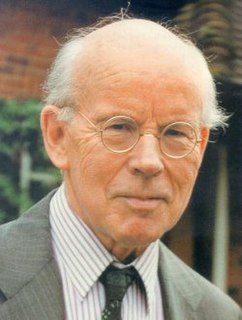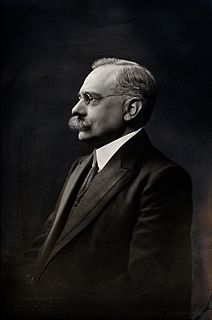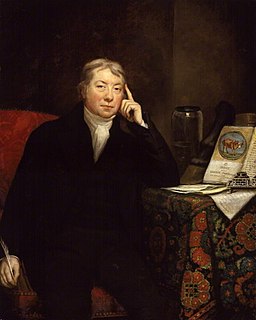
Mason Science College was a university college in Birmingham, England, and a predecessor college of Birmingham University. Founded in 1875 by industrialist and philanthropist Sir Josiah Mason, the college was incorporated into the University of Birmingham in 1900. Two students of the college, Neville Chamberlain and Stanley Baldwin, later went on to become Prime Ministers of the UK.
Braxton Hicks contractions, also known as practice contractions or false labor, are sporadic uterine contractions that may start around six weeks into a pregnancy. However, they are usually felt in the second or third trimester of pregnancy.
Antenatal steroids, also known as antenatal corticosteroids, are medications administered to pregnant women expecting a preterm birth. When administered, these steroids accelerate the maturation of the fetus' lungs, which reduces the likelihood of infant respiratory distress syndrome and infant mortality. The effectiveness of this corticosteroid treatment on humans was first demonstrated in 1972 by Sir Graham Liggins and Ross Howie, during a randomized control trial using betamethasone.

William Buchan was a Scottish physician and author. He is best known for his work Domestic Medicine: or, a Treatise on the Prevention and Cure of Diseases by Regimen and Simple Medicines, which provided laypeople with detailed descriptions of the causes and prevention of diseases. Buchan's goal was one of "laying medicine more open to mankind." With over 80,000 copies and 19 editions sold in Buchan's lifetime, it was one of the most popular medical texts in Europe and even in the European colonies in the Americas, and was translated into almost every major European language.

Erich Franz Eugen Bracht was a German pathologist and gynaecologist born in Berlin.

Etamsylate is an antihemorrhagic agent which is believed to work by increasing resistance in the endothelium of capillaries and promoting platelet adhesion. It also inhibits biosynthesis and action of those prostaglandins which cause platelet disaggregation, vasodilation and increased capillary permeability.
Charlotte Morrison Anderson AM FRACP FRCP FACP FRCPCH was an internationally renowned Australian scientist, physician and academic. She pioneered the field of paediatric gastroenterology working on health issues including cystic fibrosis and coeliac disease. She was the first woman professor of paediatrics in the United Kingdom.

Sir John Peter Mills Tizard was a British paediatrician and professor at the University of Oxford. Tizard was principally notable for important research into neonatology and paediatric neurology and being a founder member of the Neonatal Society in 1959. Tizard was considered the most distinguished academic children's physician of his generation.
The Harveian Oration is a yearly lecture held at the Royal College of Physicians of London. It was instituted in 1656 by William Harvey, discoverer of the systemic circulation. Harvey made financial provision for the college to hold an annual feast on St. Luke's Day at which an oration would be delivered in Latin to praise the college's benefactors and to exhort the Fellows and Members of this college to search and study out the secrets of nature by way of experiment. Until 1865, the Oration was given in Latin, as Harvey had specified, and known as the Oratio anniversaria; but it was thereafter spoken in English. Many of the lectures were published in book form.

Sir Fielding Ould was an Irish doctor and medical writer.

The Denis Browne bar, also known as the Denis Browne splint or foot abduction orthosis, is a medical device used in the treatment of club foot. The device is named after Sir Denis Browne (1892-1967), an Australian-born surgeon at Great Ormond Street Hospital in London who was considered the father of pediatric surgery in the United Kingdom. Browne first described the device in 1934. The bar may be used as part of the Ponseti method, a series of nonsurgical techniques to address club foot.

John William Ballantyne FRSE FRCPE was a Scottish physician and obstetrician. In his teaching of female doctors he was a pioneer in the advancement of female professional training in the field of medicine. He made major advances in the field of midwifery in the late 19th and early 20th century, with influences still felt today. He founded the science of antenatal pathology.

Neena Modi is a British physician and Professor of Neonatal medicine at Imperial College London. She is the current president of the UK Medical Women’s Federation, and past-president of the Royal College of Paediatrics and Child Health, serving in this role from April 2015 to April 2018. She is one of only four women to ever hold this position.

The Edward Jenner Medal is awarded occasionally by the Royal Society of Medicine to individuals who have undertaken distinguished work in epidemiological research.
The James Cook Medal is awarded on an occasional basis by the Royal Society of New South Wales for "outstanding contributions to science and human welfare in and for the Southern Hemisphere". It was established in 1947 from funds donated by Henry Ferdinand Halloran, a member of the Society.

Peter MacNaughton Dunn, FRCP, FRCOG, FRCPCH was an English paediatrician. Dunn was most notable for introducing into the UK the Gregory box in 1971, that provides Continuous positive airway pressure in the treatment of infant respiratory distress syndrome of the newborn and conducting research into Hip dysplasia and fetal adaptation to extrauterine life. Dunn was also notable for being known for founding the charity association British Association of Perinatal Medicine.

The Edinburgh Obstetrical Society is a medical society in Edinburgh devoted to obstetrics. It was founded in 1840 by Robert Bowes Malcolm and boasts James Young Simpson as their most eminent past member.

The Fitzpatrick Lecture is given annually at the Royal College of Physicians on a subject related to history of medicine. The lecturer, who must be a fellow of the College, is selected by the president and may be chosen to speak for two years successively. The lectures are supported by funds from the Fitzpatrick Trust which was established in 1901 by Agnes Letitia Fitzpatrick with a £2,000 donation in memory of her physician husband Thomas Fitzpatrick. Agnes was influenced by her husband’s close friend, Sir Norman Moore, who persuaded her to choose ‘’history of medicine’’ as a subject. Subsequently, Moore was credited with its idea and implementation.

British Association of Perinatal Medicine known as BAPM, is a charitable organization that was founded in Bristol in 1976 that is most notable for being a pressure group to advance the standards of perinatal care within the United Kingdom by a dedicated core of professional physicians who are accredited by examination.
Neil McIntosh is a British and Scottish paediatrician and neonatologist who was most notable for being the leading writer of a pivotal article that defined standards of ethical behaviour in paediatrics, including withdrawal of newborn intensive care. McIntosh is emeritus professor of Neonatology and Child Life and Health at the University of Edinburgh. During McIntosh's career he has researched mineral metabolism in preterm infants, computerised acquisition of physiological data in Neonatal Intensive Care Nursing, and recently an animal model of retinopathy of prematurity.














